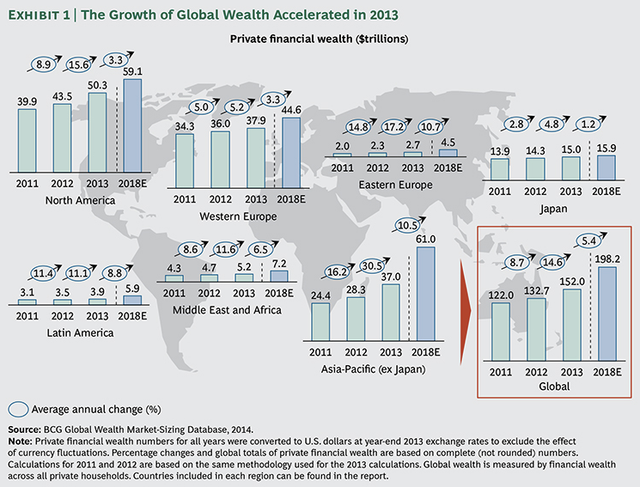Global Private Wealth surges by 14.6 percent in 2013

Global financial private wealth grew by 14.6 percent in 2013, according to a new report by TheBoston Consulting Group. The surge, concentrated in the hands of the billionaires and millionaires of the world, has been driven by the policy of the Obama administration and other governments to pump cheap cash into the hands of the major banks and stock markets.
Private financial wealth, as defined by the Boston Consulting Group, “includes cash and deposits,money market funds, and listed securities…life and pension assets, and other onshore and offshore assets.” However, it does not include “investors’ own businesses, any real estate, and luxury goods.”
Total global private financial wealth grew to $152.0 trillion in 2013. The percentage increase was almost double the 2012 increase of 8.7 percent.
 Source: BCG Global Wealth Market-Sizing Database
Source: BCG Global Wealth Market-Sizing Database
The growth in wealth was driven, overwhelmingly, by the inflation of the stock market. Of the total growth of $19.3 trillion, $15.2 trillion came from already existing assets and only $4.1 trillion came from newly created wealth. The entirety of the growth in already existing assets came from “equity performance.” This growth actually made up for losses in the performance of bonds.
The world’s actual GDP expansion rate in 2013, 2.9 percent, tells a completely different story. Throughout the world, economic growth has slowed. Wealth, primarily concentrated in the hands of the super-rich, has increased at a rate that is five times faster than the actual growth of the economy.
The data point to an unmistakable trend: the global economy is not in a recovery. New wealth in the world has primarily been an increase in the paper value of existing assets, not the expansion of production.
This process has been driven by the policy of quantitative easing and low, and even negative, real interest rates. The US Federal Reserve has been purchasing tens of billions of dollars’ worth of assets every month from the major banks. Half of this money goes to buy Treasury bonds and the other half to the virtually worthless mortgage-backed securities, which still plague the books of the major banks and investment funds.
At its peak, the US central bank was purchasing $85 billion a month from the major banks. Though the Federal Reserve has begun to “taper” purchases, Janet Yellen, the Fed’s current chairman, has said the agency “is still adding to its holdings, and those sizable holdings continue to put significant downward pressure on long-term interest rates, support mortgage markets, and contribute to favorable conditions in broader financial markets.”
This policy is echoed in Europe and Japan. Earlier this month the European Central Bank (ECB) brought down one of its interest rates to below zero percent and its major rate to a historic low of 0.15 percent. In Japan, the central bank has been generating between $585 and $680 billion every year to keep interest rates low.
This policy of an open spigot to the banks has benefited the ultra-rich and rich exclusively. While the global economy grew at the rate of 2.9 percent in 2013, those owning more than $100 million dollars in assets saw their wealth increase by 19.7 percent. Again, this excludes the wealth that a capitalist may have through his own company’s stock.
While the millionaires living in China grew in 2013, from 1.5 million to 2.4 million, the millionaires living in Japan fell from 1.5 million to 1.2 million. In the United States in 2013 there were 16.3 million households that had over a million dollars in total assets, up from 13.7 million in 2012.
Meanwhile poverty, hunger, homelessness and joblessness are on the rise throughout the world. In Britain, a new report estimates that a third of children in Britain will live in poverty by 2020. The 85 richest people in the world have more wealth than the bottom half of humanity, 3.5 billion people.
The report from the Boston Consulting Group also projects where wealth will be generated over the next four years. The report predicts that in Japan and North America new wealth will come primarily from already existing assets, whereas in the Asia-Pacific (excluding Japan) new wealth will primarily be from new assets. The report predicts that there will be a total growth of $46.2 trillion in personal financial wealth between 2013 and 2018. Asia-Pacific (excluding Japan) accounts for more than half of that wealth.
Also of note is the extreme growth of private wealth in China in 2013. During the course of the year, there was a 49.2 percent growth in private wealth held in China. This growth was primarily the result of the ballooning of the country’s “shadow banking” sector.
In the Asia-Pacific (excluding Japan) as a whole, private wealth grew by 30.5 percent. The report notes the rise of offshore banking centers in Asia, specifically Hong Kong and Singapore, as being a haven for the ultra-rich when it comes to their money management. By 2018, the private wealth of this region is set to overtake North America at an estimated $61.0 trillion.
By Gabriel Black, World Socialist Web Site